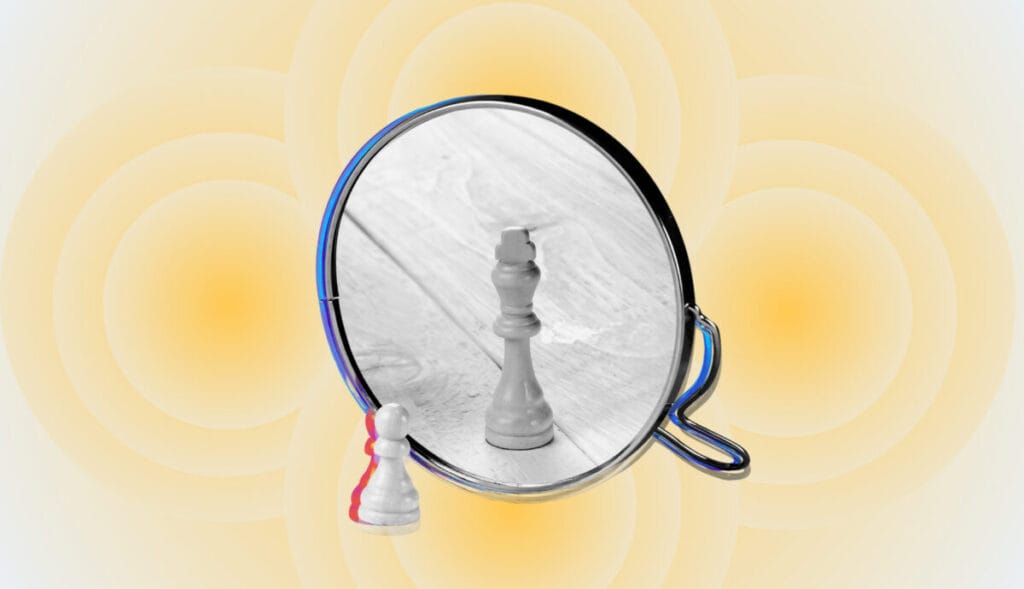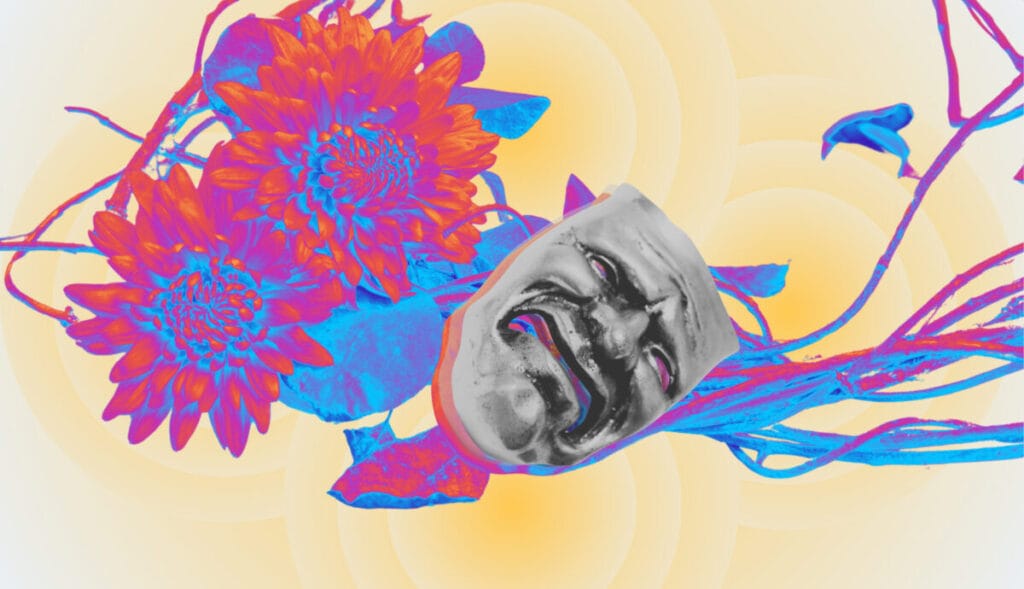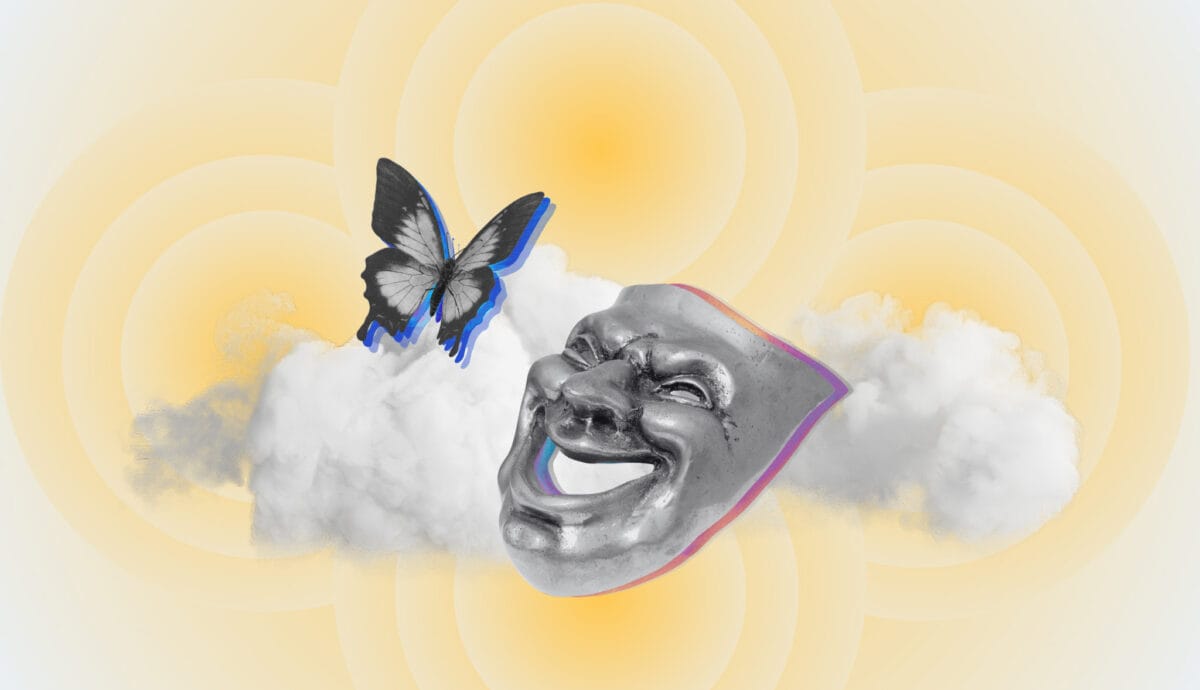During a crowded mid-pandemic Zoom seminar on microdosing for addiction treatment, a few attendees raised caution over the dangerously simplistic ways in which addiction was being presented. Within moments, a frenzy of animosity resounded.
“Why are you bringing your negativity here?” one participant asked.
“The presenters are doing great—why not recognize that?” another chimed in.
“If you don’t like microdosing, you can git out!” yet another declared.
I would have been surprised if I hadn’t witnessed other psychedelic conversations where “negativity” was not welcome and legitimate criticism was deemed “bad vibes.” What did surprise me was the group’s validation – even the facilitator joined in and scolded the critics. Then again, since such critiques threatened his microdosing livelihood, I suppose his attitude made sense.
I noticed a similar – albeit more concerning trend – arise in February 2021, when a video surfaced of former 5-MeO-DMT facilitator Dr. Martin Ball boastfully recounting the time he vomited on the face of a client incapacitated by the powerful toad venom. For each objection to Ball’s blatantly unethical behavior, a defense kicked back, spitefully ridiculing the judgmental “snowflakes” and their “low vibrations.”
I’m all for a fair trial. But some actions are not OK, and vomiting on the face of an incapacitated person in your care is one of them. Evidently, many psychonauts disagree.
What is this trend I’m pointing to, this negativity about negativity, this shaming of voices raising valid concerns? This is a trend I’m calling “psychedelic bypassing.”
Psychedelic Bypassing: The many ways the mind can excuse abuse, ignore the darker sides of ourselves, categorize the vast scale of emotions into little boxes of “good” and “bad,” and cast aside anything deemed “lesser than” — all in the pursuit of a more enlightened life.

A Primer on Spiritual Bypassing
To understand psychedelic bypassing, it’s important to first understand spiritual bypassing.
In 1984, meditation teacher and psychotherapist John Welwood coined the term “spiritual bypassing.” As laid out in Robert Augustus Masters’ book Spiritual Bypassing: When Spirituality Disconnects Us from What Really Matters, spiritual bypassing is “the use of spiritual practice and beliefs to avoid dealing with our painful feelings, unresolved wounds, and developmental needs.”
In other words, it is disguising patterns of avoidance with New Age lingo that liberates us from confronting difficult and painful realities. In short, Masters describes spiritual bypassing as “avoidance in holy drag” — a strategy “not only for avoiding pain but also for legitimizing such avoidance.”
But What Does This Have to Do With Psychedelics?
Don’t psychedelics force us to confront difficult and painful realities, no matter how fervently we resist? A lot of the time, yes. But not all the time.
Amidst abundant scientific research demonstrating that psychedelics catalyze profound healing for an ever-expanding cast of conditions, many advocates appear to have forgotten that psychedelics can also inflict harm. Despite suggestions from mainstream narratives, taking psychedelics is not a guaranteed route to healing. Just as psychedelics can heal our wounds, they can also amplify our capacity to avoid those wounds — and, in the case of the face-vomiting Ball, even inflict them on others.
Plunder the depths of Erowid and you’ll find no shortage of reports of psychedelics catalyzing psychotic breaks. Read through Chacruna‘s website, and you’ll find abundant articles on sexism and racism in psychedelic spaces, sometimes at high levels of influential organizations. Dig deeper, and you’ll find stories of people being physically, psychologically, and sexually abused in “safe” psychedelic environments.
Psychedelics are non-specific amplifiers, meaning they can amplify our darkness as well as our light. Just as psychedelics can open space for curious inquiry and new perspectives, they also provide fertile ground for embedding distorted beliefs and behaviors more deeply. If psychedelics solely induced awakening, why would the CIA spend decades researching their potential to control people in myriad ways?
Intention and context make all the difference. When self-delusion is the operating principle, psychedelics can amplify the delusion. And we mustn’t underestimate the mind’s capacity to delude itself. In the words of Carl Jung, “People will do anything, no matter how absurd, in order to avoid facing their own souls.”
And still a perspective spreads that psychedelics can only transform our world for the better, and anyone who raises concerns about their potential harms is a “threat to the movement.” Victims and their allies are silenced by a chorus of proselytizers who justify themselves, saying, “We’re so close to FDA approval! It’s not worth putting all this progress in jeopardy!”
No one wants another Nixon slamming down the great gavel on substances that can clearly help countless people. But when avoidant patterns proliferate unchecked, they become a culture, and when a culture avoids serious issues and vilifies those who speak about them, that culture deepens traumatic neural pathways that damage ourselves, our loved ones, and our world.
No matter how enraptured in the Godhead its constituents become, a culture that evades its most pervasive issues will never be a culture of widespread healing.

Why Do People Engage in Psychedelic Bypassing?
Sometimes, it’s as simple as refusing to hear what we don’t want to hear. For instance, early in 2021, preliminary research from Imperial College London showed that the life-enhancing benefits of microdosing, as reported on countless podcasts and blogs, may be attributable to the placebo effect.
The response of the microdosing community?
A chorus of people instantly ripped on the study, refusing to consider the possibility that the results had validity, because… well, the results didn’t jive with their beliefs (or their business interests).
Such instances of bypassing are easy to recognize. Other times, bypassing is more complex, stemming from sources beyond the reach of awareness.
Psychological vs. Spiritual Bypassing
Robert Augustus Masters argues that bypassing flourishes when the spiritual is separate from and given more significance than the psychological. Countless spiritual practices emphasize “letting go” of pain, securing stability in a palace of positivity whose iron gates seal out all dementors. “Don’t mind the dementors that breach the castle in your nightmares!” the spiritual teacher preaches. “Just focus on the light, and your pain will dissolve away.”
The thing is, that pain often stems from psychological wounds, and spiritual practice that denies it won’t make it disappear. While meditation can be healing, it can also enhance patterns of disassociation and withdrawal that bar people from experiencing intimacy and love.
Buddhist teacher Jack Kornfield speaks to this phenomenon in his book, A Path With Heart. After a decade of vigorous Buddhist training, Kornfield felt he had resolved his issues. However, when he returned to the States and entered a romantic relationship, he found he was “still emotionally immature, acting out the same painful patterns of blame and fear, acceptance and rejection that I had before my Buddhist training.”
Kornfield’s monastic isolation kept him distant from his deepest wounds, which were relational in nature. “I’ve seen how many other students misunderstand spiritual practice, how many have hoped to use it to escape from their lives” and “avoid the pains and difficulties of human existence” writes Kornfield.
Whether we meditate for decades or blast ourselves into cosmic unity with every psychedelic under the sun, we still may be avoiding the most pertinent issues stunting our psychological development.
The Traps of Transcendence and Oneness
Transcendence is a psychedelic buzzword, often regarded as a healing path of “overcoming” wounds and becoming more whole. It can also justify bypassing, for many transcenders cast negative judgment on that which must be transcended — often their psychological and emotional pain.
“When transcendence of our personal history takes precedence over intimacy with our personal history, spiritual bypassing is inevitable,” Masters writes. Healthy transcendence embraces that which is transcended, while “unhealthy transcendence avoids it, making a spiritual virtue out of rising above whatever is deemed ‘lower’ or ‘darker’ elements of our nature.”
In the framework of influential transpersonal psychologist Ken Wilber, development is not about transcending, but transcending and including what came before.
Transcendence is similar to another psychedelic buzzword, “oneness.” In the face of conflict and difference, many psychedelic advocates like to remind others that “we are all one.” While this is true at some metaphysical level, it invalidates the reality of difference and the struggles many face because of those differences, such as people who hold marginalized identities and experience overt oppression every day.
What kind of “oneness” casts out all who don’t bliss out on the same medicine? Nothing more than the oneness of a bubble that resists what threatens to pop it.

The Happy Place Where Egos Die
Masters writes that we are vulnerable to spiritual bypassing when we practice to reach a better place — where suffering is abolished, where love and light reign in the resuscitated Garden of Eden.
When that’s the ideal, we villainize and shame the parts of ourselves we believe block us from that idealized perfection. We may even deny their existence, because according to our high/low, positive/negative ethic, these parts indicate we are far from reaching Happy Fun Land. If we’ve been presenting ourselves as a spiritually-evolved being, then no one can know about these parts of us. So we shove them down with a Buddha smile, forcing ourselves to connect to compassion and eliminate the enemy of our “lower” nature.
This trend is especially evident in the psychedelic concept of “ego death.” Psychedelic folks often villainize the “ego,” which is typically comprised of these “lower” aspects of our nature. When ego death is the aim, anything resembling ego becomes an obstacle. When ego is not recognized as an essential part of our inner world, that essential part of our inner world becomes the villain, creating a war within ourselves.
I imagine this is partly due to psychedelic healing being framed in the same way that yoga, meditation, and numerous “alternative” healing methods are marketed: Do this, and your life will improve dramatically. This idea is even more intoxicating with psychedelics because a) they work faster, and b) a boatload of science backs up their efficacy. But when we fall prey to this “magic pill” mentality, we follow a falsely advertised claim that psychedelics will transport us to Big Rock Candy Mountain, where our egoic problems evaporate.
This thin narrative brings too little focus to the fact that psychedelic healing isn’t sustainable without significant changes in lifestyle and thought patterns. Feeling awesome and gaining perspective on your suffering is rarely sufficient. It is the beginning of a new path, and without commitment to new ways of being, benefits tend to vanish as quickly as they appeared.
Psychedelic folks often speak of “integration” as some finite place, like, “I integrated deep realizations about my anxiety on MDMA, so now it’s gone!” Healing isn’t always linear, nor is it about arrival. It can be cyclical, and when we cling to states of bliss, we bypass whatever threatens those states’ supremacy. Integration isn’t a final arrival, but an ongoing process of active engagement. As Jung wrote, “There is no linear evolution; there is only a circumambulation of the self.”

Recognizing Dualistic Thinking
Bypassing can also be a symptom of dualistic thinking getting carried into the nondual realms psychedelics can open, where reality does not abide by rational structures. Rather than categorical frameworks like “good/bad” and “self/other” ruling the day, the ground of truth becomes paradox, beyond the reach of reason’s limits. As rationality fights to make sense of such an experience, it often subjects the paradoxical to the categorical, applying dualistic labels like “good” and “bad,” and “me” and “not me” to the experience.
Picture this: say I have a mystical experience on five grams of mushrooms, and I realize that at my core, I am love embodied. I’m so immersed in the experience that I am certain my demons have been forever cleansed. Three days later, I get cut off on the highway, and a familiar anger takes hold as I curse that reckless SOB. I pause, thinking, “This anger can’t be me, because I now know I am pure love, and I can’t be love and simultaneously feel such hostility.” So I reject my anger, creating a schism in my psyche that spawns a dualistic battle that will rage indefinitely, no matter how vehemently I deny it.
If, on the other hand, I recognize that I can be love embodied and feel intense anger at the same time, I give myself more space. In that space, I can feel anger without identifying it or fearing it is me at the core.
Passivity and Aversion to Anger
In numerous spiritual communities, anger is the quintessential “low vibe” emotion. Countless frameworks teach to restrict its expression, if not eliminate it completely. Only then can you abide in whatever nirvanic illusion is the goal.
The problem is, anger is an essential human emotion, and a powerful one. Powerful emotions don’t just go away when we deny them. They get stronger, and even if we stop ourselves from expressing them externally, we end up expressing them toward ourselves.
“There isn’t any such thing as a negative emotion,” Masters writes. “There are negative things we do with our emotions, but our emotions themselves are neither negative nor positive. They simply are.”
When we judge anger, we are often judging harmful expressions of anger, such as hostility and violence. The emotion and the behavior are distinct, and becoming more intimate with the emotion and its sources will open healthier, more conscious avenues of expression.
When we judge our anger as “bad energy,” we judge it as such in others. When a community validates that judgment as virtuous, that community shuns an essential emotion that has a lot to teach us about boundaries, needs, and deep wounds.
In hearing about practitioners abusing clients, it makes sense to be angry. If we shun our anger, we disregard the wisdom of this response and may even justify the practitioner’s behavior, saying, “They’re doing their best. Who am I to judge if that’s right or wrong?” In that response, both our anger and someone’s harmful behavior are bypassed under a distorted ethic of “acceptance” and “forgiveness.” This encourages a passivity akin to numbness, a glorified distancing from a dark reality and the looming prospect of confrontation. It’s more comfortable to just “let it go.”
Maybe this trend is reducible to a reluctance to cast judgment. Moral relativism — the notion that each person’s moral code is justified unto itself — is a seductive ethos, but it promotes a passivity that allows harm to flourish unchecked. Anger about harmful behaviors is not “bad energy”; it is a valid, important response to issues that could implode this whole psychedelic renaissance if they remain unchecked. Transformation can only come by calling problematic issues to conscious light, and anger can sometimes show us where those issues lay.

What is Guru Syndrome?
The psychedelic space is home to many self-appointed “guru” facilitators, many of whom are far less skilled at facilitation than they are at bypassing. How else could a self-described “healer” inflict sexual abuse on participants — an ongoing problem in psychedelic spaces — and free themselves of responsibility?
According to Masters, this form of bypassing spawns from “delusions of having arrived at a higher level of being.” Quite likely, these facilitators have had profound psychedelic experiences, and they mistakenly “confuse the attainment of such states with being at an advanced stage of spiritual practice.”
Here’s where psychedelics create a particularly tricky form of bypassing. Unlike meditation, which can take years to induce a peak experience, psychedelics can rocket anyone into sudden confrontation with the mystical. The confrontation can be so earth-shattering that the individual emerges completely certain they have been reborn, where yesterday’s troubles that occupied their “previous self” have forever melted away. That may be true for a while, but what about when yesterday’s troubles return? Since this experience birthed them anew, those troubles can no longer be them, right? This person fails to recognize this new “egoless” persona is actually the structure of a new ego that bears more similarities to the previous one than they care to admit. And how could it not, with root issues continuing to fester unresolved?
The danger then emerges as justification of harmful behavior. “Even clearly abusive behavior on the part of a spiritual teacher may be excused as an opportunity for students to grow in their practice,” Masters writes. It’s gaslighting to the extreme, fueled by an ego-boasting infallibility under the claim it is egoless and insusceptible to “lower” impulses.
It may be tempting to pass this trend off to a handful of underground practitioners, but recent revelations again show that above-ground clinicians are susceptible as well. Researcher Matthew Johnson describes this trend as “the inclination to believe that the nature of the experiences people have on psychedelics are so sacred or important that the normal rules do not apply, whether they be the rules governing clinical boundaries, the practice of clinical psychology or medicine, sound philosophy of science, or ethics.”
“Psychedelics might magnify the subtle abuses of differential power that can be at play in the routine practice of clinical psychology or medicine,” Johnson continues. “The scientist or clinician might, perhaps without explicit awareness, fall into the trap of playing guru or priest, imparting personal philosophies without a solid empirical basis.”
While psychedelics can amplify the healing of therapy, they can also amplify the transference — a client’s unconscious feelings toward the therapist. If practitioners are adept at bypassing, they are vulnerable to excess countertransference — the therapist’s feelings in response to the client’s transference. That countertransference can manifest in harmful ways, and the practitioner can justify their harmful behaviors as “part of the client’s healing” — exactly how Martin Ball justified vomiting on his client’s face.

Responsibility in Facilitating Journeys in Non-Ordinary States
What level of psychedelic bypassing has to occur for people who have allegedly perpetrated significant abuses in psychedelic spaces to rise the ranks and become some of the most influential spokespeople of the entire psychedelic ecosystem?
Part of me wants to give those who stay silent during abuse scandals the benefit of the doubt, to bury my responses beneath a higher kind of “understanding” and “forgiveness.”
Maybe everyone deserves a second chance, but giving people a shot at redemption cannot be the same as enabling them to perpetuate harms without consequence. Taking an honest look at our capacity to bypass, with or without psychedelics, strikes me as a good place to start.

